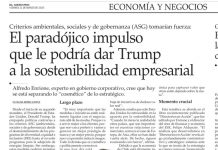Fuente: Harvard Law School on Corporate Governance
Autor: David Katz and Laura A. McIntosh, Wachtell, Lipton, Rosen & Katz
The COVID-19 pandemic has caused a societal crisis of far-reaching implications. For the moment, employee, environmental, social and governance (EESG) concerns may appear to have taken a back seat to economic survival, but in the longer term, a robust corporate response will require firms to re-evaluate their priorities. Once the economic recovery has begun in earnest, there is likely to be heightened investor interest in, and public scrutiny of, key areas of EESG, particularly as they relate to firm performance, human capital and enterprise resilience. The COVID-19 pandemic has shown that the nexus between corporate performance and societal wellbeing has never been stronger. The potential role of major corporations in perpetuating global inequities and exacerbating the disparate effects of large-scale crises, and their capacity to ameliorate human suffering through private sector action in support of government initiatives, are indisputable. For better or worse, the pandemic and future crises are likely to increase the extent to which the public perceives large corporations as entities that can and should bear a heavy burden of corporate social responsibility.
Stockholders are compelled by recent events to acknowledge that EESG-related risks have the potential to affect the creation and preservation of long-term wealth. Corporate disclosures have begun to change accordingly, as both public and private companies are focusing on stakeholder-centric communications in response to the human capital impact of the crisis. While EESG-related disclosures generally have been presented separately from financial disclosures, the pandemic has blurred the line between the two sets of issues. In the aftermath of the COVID-19 pandemic—itself fundamentally an EESG event—investors will want to know whether, and how, firms are preparing for a variety of worst case scenarios. Companies will face increased pressure to enhance their disclosure around risk management, particularly with respect to systemic crises that are non-financial in origin.
Shifting Priorities
At the start of 2020, most firms’ EESG priorities likely included climate change, pay equity, and gender diversity, and perhaps data privacy and human rights abuses. While these topics have been pushed out of the headlines for now, some EESG issues are likely to gain prominence in the post-COVID world. It is clear, for example, that companies must focus on the allocation, treatment, and vulnerability of their human capital. The pandemic has made employee safety—including not just workplace injury, but also contagious disease and emotional distress—a top priority. Consumer-facing companies also are working hard to ensure that when they reopen their doors, they do so with precautions designed to minimize public health risks for their customers and their employees. Many of these measures—such as frequent sanitizing of equipment and surfaces, and the proliferation of contactless transactions—along with an emphasis on wellness generally, are likely to persist after the pandemic is past. For companies elsewhere in the supply chain, the pandemic has highlighted the importance of human capital. Businesses are likely to augment the medical resources available to employees, presumably with corresponding safeguards for employee privacy. There may be greater support for employees with sick family members and employees who have been furloughed. In addition, the pandemic is likely to have a lasting nationalistic impact as nation-states refocus priorities to ensure that they are not relying on foreign countries for important items such as pharmaceuticals, vaccines and other crucial supplies.
Another key issue will be business continuity and resilience. Companies will be expected to bolster their ability to maintain some level of operations even if a large portion of their workforce is temporarily incapacitated, whether due to illness or another cause. Corporate leadership should ensure that an emergency temporary succession plan is in place, not only for the CEO but also for senior management and other key managerial roles. As a governance matter, to ensure timely and smooth transitions in emergency situations, boards of directors should focus on these important issues, using the pandemic as a test case, to consider the risks to human capital and how to best mitigate them. Prior to the COVID-19 pandemic, crisis management plans often focused on either external crises—such as an earthquake or significant terrorist event—or internal crises—such as a plane crash resulting in the death or incapacitation of a CEO—but not on a scenario that could impact the company’s human capital as well as society at large. Companies would be well-advised to develop contingency plans to operate in such an environment. These contingency plans could include everything from improving work-from-home capabilities to drafting succession plans that contemplate the temporary incapacity of key members of the senior management team or board of directors.
Social and economic equity will continue to be a top EESG issue, likely to garner even more attention in the aftermath of the COVID-19 pandemic. The global health crisis has exacerbated disparate impacts throughout the world. This may sharpen criticism of executive compensation practices and pay disparities between men and women. In many companies forced to fire or furlough large portions of their workforce, members of senior management were not spared; executive compensation plans were revised to show that senior management was “sharing the pain.” Further afield, watchdogs and activists are likely to look at the role of U.S. and multinational firms as participants in—if not contributors to—inequities and human rights violations in other countries. Companies may be compelled to audit thoroughly the business practices being used in their supply chains, and there may be increased accountability for failures to implement strong policies for human rights and human capital at every point along the chain. As the pandemic has made abundantly clear, events in seemingly far-off places can cause enormous disruptions at home. The message for firms is that their own actions elsewhere may be subject to greater scrutiny by investors and the general public.
While climate change is, for the moment, no longer the primary global EESG topic of concern, it is likely that in the aftermath of the pandemic, environmental concerns will again rise to the fore, along with human capital issues. In recent months, the world has seen the impact of global shutdowns on air quality and pollution, as well as the effectiveness of telework for many employees. The more corporations are perceived as social actors, the greater the expectation that they bear responsibility for addressing climate change, other environmental concerns, and EESG issues in general.
Stakeholder-Centric Disclosures
During the pandemic and recovery, disclosures are likely to become increasingly stakeholder-centric. Stakeholders will want to understand how a company is framing the current challenges, its priorities in responding to them, and the potential impact on operations and financial position. Firms should update any disclosures that have been overtaken by events—for example, reshuffled priorities, discarded initiatives, new or revised debt obligations, and materially modified practices and policies. There is a balance to be struck between consistency and specificity; communications in general should be broad enough that they can be tailored to different audiences. Companies should be thoughtful about how and where they communicate, using press releases, SEC filings, Twitter, interviews, websites, social media platforms, mass emails, and other outlets as appropriate. Companies should consider how they want to be perceived in hindsight as having weathered the pandemic and recovery.
There is likely to be pressure on companies to put forth analyses of a range of hypothetical “what-if” scenarios in order to illustrate how the business is situated going forward. The SEC has sought to assure firms that they can make forward-looking statements without undue concern regarding SEC enforcement and litigation. The Private Securities Litigation Reform Act of 1995 (PSLRA) safe harbor protects statements that are accompanied by meaningful and up-to-date cautionary statements and not made with actual knowledge of falsity. Accompanying cautionary statements should be closely tailored to the specific forward-looking statements, and any hypothetical scenarios should be expressly described as possible and theoretical rather than as forecasted or predicted.
While the SEC has given public companies assurances that the SEC will not pursue enforcement actions against companies that make forward-looking statements that prove to be incorrect in hindsight, it remains to be seen whether meaningful disclaimers will provide sufficient protection against private litigation.
In addition, companies may wish to engage with industry experts to identify risks with broad effects as well with as experts from outside the industry to think creatively about potential scenarios for analysis. As the pandemic has shown, it may be valuable for firms to contemplate, if not prepare for, hypothetical scenarios that have a low possibility of occurring but entail a high degree of disruption and harm. Investors will look at risk assessments and EESG disclosures to evaluate corporate resilience in the face of disruptions such as pandemics, terrorist activity, cyberattacks, severe climate change, and other global crises.
During this crisis, legally required disclosures should be understood as the minimum, as the market and stakeholders are likely to require significantly more disclosure from companies. In order to come through the pandemic with a strong reputation and future prospects, a firm will need to disclose what the market wants to know, from business, investor, and employee perspectives. In addition, the uncertainty created by the pandemic, which forced most companies to withdraw their earnings guidance, may reduce market pressures on companies to put out earnings guidance in the first place. That said, the need to update the market quickly must be balanced with governance concerns as well as with careful attention to compliance with Regulation FD. The CEO should work internally to make sure that the board is not surprised by any public disclosures. More frequent board or audit committee updates may be advisable in order to keep directors abreast of business plan updates, communications strategies, and other elements of crisis management.
Stakeholder Ascendancy
The COVID-19 crisis has accelerated the nascent shift toward stakeholder-oriented governance. It has heightened public expectations that companies will work toward meaningful engagement with employees, customers, investors, supply chain partners, and the broader community. Stakeholder-oriented disclosure will be a priority for the foreseeable future, and that is likely to be a lasting change. Investors have seen in recent months that stakeholder well-being and EESG factors can be integral to financial prosperity. The blurring of lines between EESG and financial disclosure is also likely to endure, as it is now clear that certain EESG issues potentially have a material impact on short-term financial returns as well as long-term enterprise value.
The burden of corporate social responsibility is likely to grow in tandem with stakeholder-oriented governance and disclosure. The private sector has been crucial to COVID-19 response in the United States, stepping up to fill preparedness gaps and provide essential supplies for distribution on behalf of the federal government. This was the right thing to do, and those firms should reap the deserved rewards of reputational benefits and pride in having assisted the national response effort. While there may be a temptation for some to view private sector contributions during the crisis as an opportunity to pressure companies to devote a portion of their capacity to the public good on an ongoing basis, thereby shoehorning private companies into a quasi-governmental role, this would be unfortunate. Companies can and will be valued by investors for being good corporate citizens, but societal pressure for companies to adopt “stakeholder capitalism” would be self-defeating if it results in enterprises that are hamstrung in their ability to innovate, grow and create jobs. At the end of the day, investors will need to signal that they are willing to accept potentially less profitable companies that focus on the interests of all stakeholders. If investors are unwilling to do so, then societal pressures on investors and firms will increase, making it more likely that governments will intervene and adopt regulation of both, as we have already seen in Europe. That intervention will likely create a suboptimal result, which is why The New Paradigm was created.












